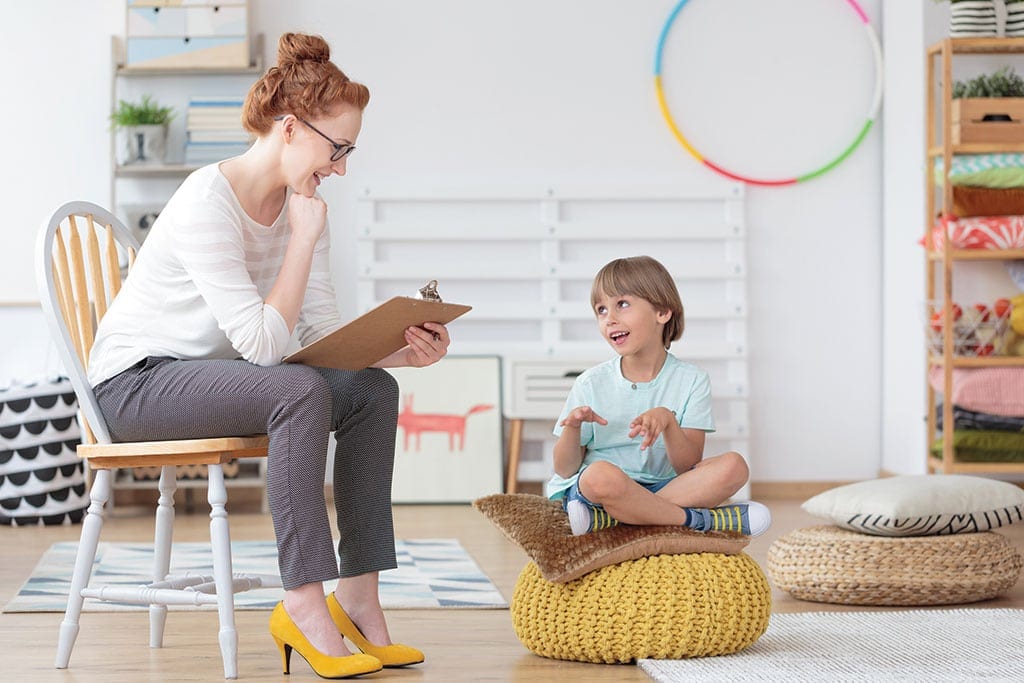Parent-to-Parent: 10 Things I Wish Someone Had Told Me
You know your child better than anyone. If you are noticing things that don’t seem quite right regarding learning, trust your gut and seek answers. While this can be stressful and lead to a journey you weren’t expecting, don’t lose hope. Other families have gone through this experience and can share their path to success. Several local parents spoke with Atlanta Parent to share advice, big wins, and what to expect.
Trust your gut.
Mike Wright’s wife, Pat, would help in their son’s first grade classroom. “It was my wife who first suspected something,” he says. “She would go into the classroom to help, and Andrew would need her the whole time. We used flash cards and found out he could not remember the words he was shown. Compared to his older sister when she was his age, he was not progressing and becoming quite frustrated. My wife saw an article about dyslexia in the newspaper describing the symptoms, and many matched our child.”
Signs vary by age group but can include: having a hard time learning nursery rhymes, trouble remembering things in the right order, having trouble sounding out words and confusing letters that look similar.
Sarah Bottini wishes she had listened to her maternal instinct earlier. She suspected her son, James, had an issue in kindergarten. “Parents have that instinctual feeling of something is off. He was always extremely verbal, very chatty, very curious, had a vocabulary above his age. I thought academics would be a breeze for him. In kindergarten, he had to learn 100 words, and every time I held up a flash card, it was as if he’d never seen it before. There was a disconnect between his intellectual curiosity and his performance at school.”
When she brought the concern up to his teacher, she was told sometimes, boys are slower learners, so they completed kindergarten hoping that was true. In the fall of first grade, she paid for a private evaluation and was informed James had dyslexia.
Find support.
“The first thing you need to know is that everything is going to be all right,” Wright says. “As a parent, you are frightened, given how fundamental reading is. The second thing you learn is that there is support out there, but you are going to have to find it and fight for it on your own.”
Look for reliable information about dyslexia. Online resources, like Reading Rockets, Understood, Made By Dyslexia and International Dyslexia Association can be helpful. As you educate yourself, you may have to unlearn some of your own misconceptions. A lot of myths surround dyslexia; for example, that kids with dyslexia just don’t like to read.
Be prepared for an uphill battle.
Kelly Caudle’s daughter, Stella Dicker, was in pre-K when she first suspected something might be wrong. Each time Caudle brought up her suspicions, she was told not to worry. It wasn’t until fourth grade she was able to get help. “What was the most frustrating about all of this was how long it took to have the proper interventions.”
Tate Groves is the mother to 14-year-old Treyson. She initially suspected something was going on in kindergarten, but it became more apparent he was struggling in first grade. She chose to have him evaluated by the school first. “I submitted a letter to the school requesting an evaluation. I was met with some opposition, and the school system’s Child Find Services Coordinator advised me that he was ‘just low’ and showed me where she felt he fell on a bell curve. I knew better. Treyson was incredibly intelligent, but reading was just so difficult. I pushed forward and he qualified for support with Specific Learning Disability in Reading. The following summer, I chose to have him evaluated privately — just as I suspected, dyslexia.”
Know dyslexia might not be the only issue.
Because dyslexia is neurobiological, children may experience other difficulties. For example, it’s estimated that 25-40% of individuals with ADHD also have dyslexia.
“Dyslexia typically doesn’t appear in isolation,” Caudle says. “There can be other things happening within a child’s brain, like trouble with writing, trouble with numbers, attention deficit. It can be difficult to find where the dyslexia fits.”
At the end of her son’s fall semester in second grade, Mandy Gawley was called in for a conference as Finnegan’s teacher suspected he was dyslexic. She recommends finding a specialist who can help you understand your child’s brain. “Beyond all of the specialists, educators, counselors, you are the expert in your child. Become an advocate for your child and teach them how to advocate for themselves early and often. This skill is imperative and will serve them for the rest of their education and their lives beyond school.”
Get tested, no matter the cost.
When her daughter Caitlin was in kindergarten, Jennifer Burch noticed that although bright, she wasn’t reading like her peers. “Caitlin was my first child,” she says. “I thought, ‘Kids just develop differently.’ The teacher also didn’t think anything of it. But she was really struggling, and I knew something wasn’t right.”
A friend had gone through a similar experience and connected Burch to the Atlanta Speech School. “They recommended a psychoeducational evaluation, but it took me some time to get behind spending that much money. When you’re in the fog of what to do next, trying to figure out how to pay for the evaluation is a big worry. I wish someone had told me it was worth it to have answers,” she advises. “It’s vital information.”
Burch also recommends looking at graduate schools in the metro area. Some schools will do evaluations at a reduced rate to help grad school students gain experience.
Understand other concerns may arise.
Dyslexia may affect more than just your child’s education. A student with dyslexia witnesses the other students in her classroom succeeding easily, which can lead to social-emotional challenges.
“I wish I had understood that dyslexia doesn’t only have academic implications,” Caudle says. “Once she reached the fourth and fifth grades, it really started to affect her socially. Other students didn’t want to work with her in groups. It made her feel stupid and led to other behaviors, like immaturity.”
Depending on your child’s diagnosis and your family situation, consider private education. There are multiple schools in the metro-Atlanta area specializing in educating children in dyslexia.
Wright is on the board of Swift School. “With few exceptions, these kids come to our school frustrated and with low self-esteem. These schools not only teach your child to read, they, just as importantly, restore their self-esteem. Your child is now surrounded by kids just like them who are learning to read the same way they are.”
Now age 12, Dicker attends The Howard School. “It has changed our daughter’s life, and it has changed my family’s lives,” Caudle says. “What fills my heart with hope is that she has experienced such tremendous growth in her self-confidence.”
Bottini’s three children are dyslexic, and all attended The Schenck School for three years. “Now, all three of them are avid readers. Their confidence is back. Dyslexic kids are high-functioning, and they are very aware they are not performing like their classmates, and their confidence takes a big hit. It has shaped how they are as students and how they view themselves.”
Learn to be an advocate.
Until there is more awareness, you may have to become an expert on your own and help the others around you understand dyslexia. “Be prepared to advocate for your child,” Wright says. “You have to know your rights and ask for them.”
Groves worked as an elementary teacher and a special education teacher prior to having children, and she was still surprised by what she learned being on the other side of education. “I didn’t realize how much I could advocate for my child as a parent. Read, research, ask questions and reach out to other parents. You may have a fabulous team of professionals in your corner who truly have your child’s educational best interests in mind, but you should be prepared.”
“We have learned that dyslexia is often misunderstood or can be dismissed altogether in our education system,” Gawley says. “Never give up. Be kind but firm. Document everything. Know your rights and seek out resources for support.”
Prepare to become passionate.
You might find your own calling in this process. For many parents, advocating leads to a lifelong passion for helping others and setting the next generation of students with dyslexia up for success.
“When Treyson was struggling so much in first grade, I really began to look into how I could help him,” says Groves. She started homeschooling Treyson, attended multiple conferences and classes, trained in Orton-Gillingham and did her own research. Treyson now attends Brookwood Christian School, where Groves also teaches, and her younger son attends as well.
Burch also wanted to help others after her own experience. She went back to school to train teachers on teaching kids with dyslexia how to read. “I completely changed careers. Now, I teach a class at the University of Georgia on helping kids that are struggling readers. It grew out of my own parenting.”
Find your community.
While dyslexia might be new for your family, people have walked this path before.
“At the beginning of our journey, I wish we would have known of families who had walked this road before us,” Gawley says. “It would have been helpful to hear that this diagnosis does not mean our child was doomed to a difficult and unsuccessful life.”
“I have found social media groups to be tremendously useful,” says Caudle. “People are so generous, and this is a positive use of social media to keep us connected and help us find one another.”
Partner with your child.
Invite your child to learn about dyslexia with you.
“Dyslexic thinking is a superpower that can help take your child wherever they want to go. Acknowledge your child’s challenges and validate their feelings as you walk beside them,” Gawley says. “Always answer their questions honestly with age-appropriate facts. Let them know that you’re in this together.”
She recommends leaning into their passions that are outside of academics. “Whatever lights them up, lean into those things. Make sure they know how much they are loved, and their value is so much more than how they perform in a classroom.”
“It can be devastating at first that your child has a learning difference,” Bottini says. “Now, I wouldn’t change my kids’ brains if I could. If you give them the scaffolding they need to succeed, you don’t need to view it as something sad. Once they’re remediated, you can appreciate the struggle they’ve been through and the amount of grit it’s taken.”









